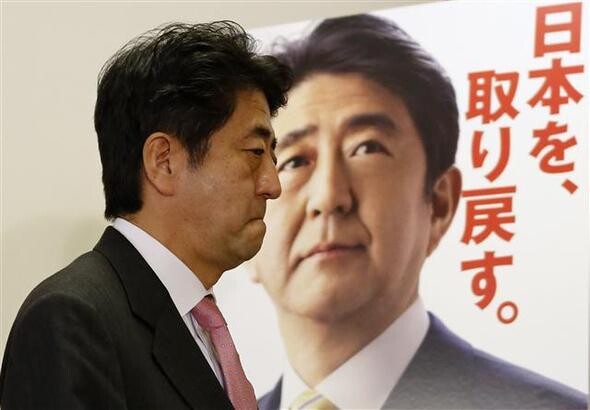hankyoreh
Links to other country sites 다른 나라 사이트 링크
US trying to rein in Japan’s attempts to deny its history

By Jeong Nam-ku, Tokyo correspondent
The US government is taking action to put the brakes on movement in the Japanese government headed by Prime Minister Shinzo Abe to retreat on historical statements it has made, the Nikkei newspaper reported.
“In response to indications that the Japanese government could alter the historical position contained in the (Chief Cabinet Secretary Yohei) Kono Statement of 1993, which acknowledged that the Japanese military had forced women into sexual slavery, the US government is calling for prudent action. US officials communicated this message to multiple high-ranking Japanese government officials last year,” the Japanese paper reported on Jan. 6.
According to the paper, a high US government official said “If Japan attempts to alter the Kono Statement, the US government will have no choice but to take some kind of concrete action.”
The paper interpreted this ‘concrete action’ as likely being the issuance of a statement expressing the American government’s concerns.
In explanation of the move by the US, the paper said, “Since revision by Abe’s administration of Japan’s historical stance could severely damage the relationship with neighboring countries such as South Korea and China, the US government is concerned that this might compromise stability in the Asia-Pacific region, which it regards as a priority.”
In an interview with the Sankei Shimbun newspaper on Dec. 31, 2012, Abe made a reference to the (Prime Minister) 1995 Murayama Statement, in which Japan showed remorse for and apologized for its colonization of Korea. “The statement was made on the fiftieth anniversary of the end of the war. Seeing that time has passed and we are now in the 21st century, I want to make a forward-looking statement from my cabinet, a statement that is appropriate for our time. To achieve this, I plan to form a committee of experts and review our options.”
Regarding the Kono Statement of 1993, Abe said, “I will listen to the opinions of experts and consider our course of action under the oversight of the Chief Cabinet Secretary.”
When the first Abe administration, which took power in September 2006, implied that it was going to retract the Kono Statement of 1993, the relationship between South Korea and Japan started to deteriorate. In response, the US took firm action, with the House of Representatives passing a resolution on July 30, 2007 criticizing the Japanese forced conscription of the so-called comfort women.
On Jan. 3, the New York Times published an editorial titled “Another Attempt to Deny Japan’s History.” The editorial criticized Abe for making a “a serious mistake that would inflame tensions with South Korea.”
Please direct questions or comments to [english@hani.co.kr]

Editorial・opinion
![[Column] Has Korea, too, crossed the Rubicon on China? [Column] Has Korea, too, crossed the Rubicon on China?](https://flexible.img.hani.co.kr/flexible/normal/500/300/imgdb/original/2024/0419/9317135153409185.jpg) [Column] Has Korea, too, crossed the Rubicon on China?
[Column] Has Korea, too, crossed the Rubicon on China?![[Correspondent’s column] In Japan’s alliance with US, echoes of its past alliances with UK [Correspondent’s column] In Japan’s alliance with US, echoes of its past alliances with UK](https://flexible.img.hani.co.kr/flexible/normal/500/300/imgdb/original/2024/0419/2317135166563519.jpg) [Correspondent’s column] In Japan’s alliance with US, echoes of its past alliances with UK
[Correspondent’s column] In Japan’s alliance with US, echoes of its past alliances with UK- [Editorial] Does Yoon think the Korean public is wrong?
- [Editorial] As it bolsters its alliance with US, Japan must be accountable for past
- [Guest essay] Amending the Constitution is Yoon’s key to leaving office in public’s good graces
- [Editorial] 10 years on, lessons of Sewol tragedy must never be forgotten
- [Column] A death blow to Korea’s prosecutor politics
- [Correspondent’s column] The US and the end of Japanese pacifism
- [Guest essay] How Korea turned its trainee doctors into monsters
- [Guest essay] As someone who helped forge Seoul-Moscow ties, their status today troubles me
Most viewed articles
- 1[Column] The clock is ticking for Korea’s first lady
- 2Samsung barricades office as unionized workers strike for better conditions
- 3[Correspondent’s column] In Japan’s alliance with US, echoes of its past alliances with UK
- 4After 2 months of delayed, denied medical care, Koreans worry worst may be yet to come
- 5[Column] Has Korea, too, crossed the Rubicon on China?
- 6Hong Se-hwa, voice for tolerance whose memoir of exile touched a chord, dies at 76
- 7US overtakes China as Korea’s top export market, prompting trade sanction jitters
- 8All eyes on Xiaomi after it pulls off EV that Apple couldn’t
- 9[Photo] Smile ambassador, you’re on camera
- 10[News analysis] After elections, prosecutorial reform will likely make legislative agenda